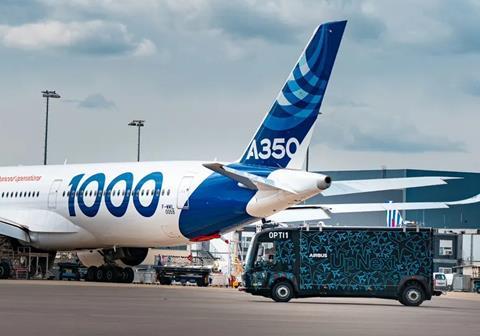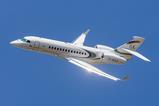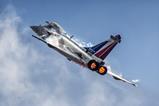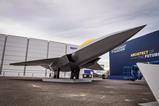Airbus UpNext, the airframer’s innovation arm, is gearing up for flight tests early next year of an A350-1000 fitted with advanced automation systems developed through its Optimate project.
Designed to support automatic taxiing and enhanced pilot assistance features, the three-year project kicked off in May 2024.

Ground tests of a suite of technologies have been taking place in Toulouse using a specially adapted electric truck.
In addition to a variety of sensors – including Lidar, Radar, optical cameras, and GPS – the truck incorporates a full A350 cockpit, plus a flight engineer station in the rear, to ensure fidelity with the test aircraft.
Beyond the hardware, the vehicle also uses advanced data fusion and machine learning to improve aircraft navigation systems, the human-machine interface and overall flight safety.
Jonathan Rigaud, head of Optimate, says the project has “learned a lot” over the past year, during which it has accumulated more than 150h of testing.
UpNext has successfully integrated the vehicle – which has its own call-sign, OPTI1 – into the operational flow at Toulouse airport, co-ordinating its movements with air traffic control.
These have seen the truck perform a simulated departure from a gate and taxi automatically across the airfield while communicating with the control tower.
Collision avoidance systems aboard the vehicle – designed to simulate an A350’s 64.7m (212ft) wingspan – have also been out through their paces.
A central part of Airbus’s future vision is that aircraft will be able to automatically communicate with each other and the control tower and respond or alert the crew accordingly.
Accurate position information is key to realising that concept, but Rigaud says one key finding is that that GPS does not provide a “sufficient” degree of “robustness and integrity” in relation to an aircraft’s location.
“You need know to a high degree of accuracy where we are and where others are,” he says.
Alternative quantum-based sensors are instead being considered.
Although ground testing with the truck is continuing, the Optimate team is already looking at what Rigaud calls “the next episode”.
“We have tested the best concepts and put them, together with the algorithm behind them, into our A350,” he says.
Ground tests of the widebody in the “real configuration” and in “real traffic” took place in March as the airframer builds towards flight tests.
Due to begin in early 2026, this will consist of a “gate-to-gate” mission that also incorporates a simulated weather diversion.
Rigaud says the Optimate system will alert the crew and ATC and automatically identify the best alternate airport if it detects a potential weather problem at the destination.
However, the crew will retain the final decision on whether to accept the suggested course change.































